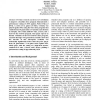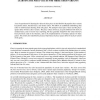316 search results - page 2 / 64 » Learning to Play the Game of Chess |
CG
2006
Springer
13 years 8 months ago
2006
Springer
While recently the strength of chess-playing programs has grown immensely, their capability of explaining in human understandable terms why some moves are good or bad has enjoyed l...
CIG
2005
IEEE
13 years 10 months ago
2005
IEEE
Previous research on the use of coevolution to improve a baseline chess program demonstrated a performance rating of 2550 against Pocket Fritz 2.0 (PF2). A series of 12 games (6 wh...
ICGA
2008
13 years 4 months ago
2008
A set of experiments for learning the values of chess pieces is described for the popular chess variants Crazyhouse Chess, Suicide Chess, and Atomic Chess. We follow an establishe...
IJCAI
1993
13 years 5 months ago
1993
Human chess players exhibit a large variation in the amount of time they allocate for each move. Yet, the problem of devising resource allocation strategies for game playing did n...
CG
2000
Springer
13 years 9 months ago
2000
Springer
Abstract. Over the years, various research projects have attempted to develop a chess program that learns to play well given little prior knowledge beyond the rules of the game. Ea...


